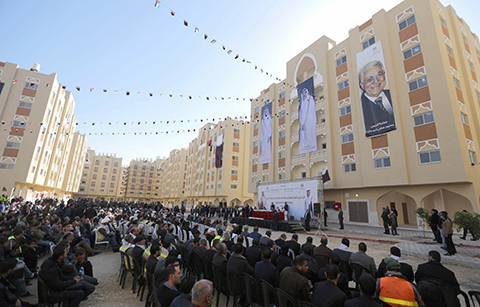 Palestinians attend the opening of the Sheikh Hamad residential project in the southern Gaza Strip town of Khan Younis on January 16, 2016. One thousand units financed by Qatar were attributed to Gazans whose homes were razed during the Israeli offensive on the enclave in 2014 which displaced thousands of people. Qatar pledged 407 million dollars for the reconstruction of Gaza including the construction of apartments, infrastructure and a hospital. / AFP / MAHMUD HAMS
Palestinians attend the opening of the Sheikh Hamad residential project in the southern Gaza Strip town of Khan Younis on January 16, 2016. One thousand units financed by Qatar were attributed to Gazans whose homes were razed during the Israeli offensive on the enclave in 2014 which displaced thousands of people. Qatar pledged 407 million dollars for the reconstruction of Gaza including the construction of apartments, infrastructure and a hospital. / AFP / MAHMUD HAMSGAZA: Qatari-funded construction projects have provided 1,000 new dwellings for Palestinians left homeless by the 2014 Gaza war with Israel, and a similar number for low-income families in the territory, officials said yesterday. The Gulf state's contribution is the sole significant sign of rebuilding in the Gaza Strip, where some 100,000 people remain displaced 18 months after the fighting, with economic growth stifled by Israeli and Egyptian blockades. Ismail Haniya, the Hamas chief in Gaza, called the completion of the first stage "a historic moment".
The Qatari donations have buoyed Gaza's de facto Islamist Hamas rulers, irking Israel and the US-backed Palestinian administration based in the occupied West Bank. Past efforts by Qatar to mediate between Hamas and Israel yielded little. After the 2014 war, Qatar pledged $1 billion for building projects in Gaza, of which $50 million was paid to owners of destroyed houses to fund the rebuilding of shelters. Qatar envoy Mohammed Al-Amadi said 1,000 new homes had been completed since.
"Qatar exerts every effort to help the people of Gaza in the fields of electricity, agriculture, infrastructure and housing, including the rebuilding of completely destroyed houses," Amadi told Reuters. Gaza economist Maher Al-Tabbaa said reconstruction efforts were being hampered by difficulties in bringing raw materials to Gaza. Israel bars the import of products it suspects Hamas might use to rearm or build fortifications, although it began easing restrictions in October under a mechanism overseen by the United Nations.
"Only 400,000 tonnes of cement have entered Gaza since October 2014, or the equivalent of Gaza's need of cement in two months only," said Tabbaa, who is also in charge of public relations at Gaza's Chamber of Commerce. Officials said yesterday that Qatari funding had provided another 1,060 new homes in the Gaza town of Khan Younis for low-income families. An Indonesian-funded hospital opened in Gaza last month, the first new medical centre in the territory in a decade.
Yesterday, Qatari and Palestinian flags adorned the complex as buses dropped hundreds of people who will receive the apartments. Posters of the former Qatari emir, his succeeding son and Palestinian President Mahmoud Abbas hung from the buildings. The families received certificates at the event, but won't move in for another two months due to minor infrastructure work, such as paving the roads to the city and connecting it with water network.
Among those who received certificates was Samia Al-Nakhala, 39, who lives with her husband and son in a home that costs $250 a month in rent. Now she will pay the cost of the house in monthly installations of $170. "Instead of throwing my money in the air every month, now I will be paying for my own home," she said. - Agencies










